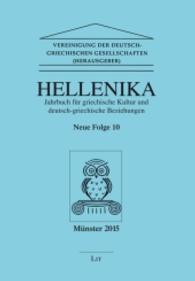- ホーム
- > 洋書
- > ドイツ書
- > Humanities, Arts & Music
- > Linguistics
- > general surveys & lexicons
Full Description
This data-oriented study aims at providing an onomasiological account of the historical synonyms of the term fallen woman from Old English up to Early Modern English. It focuses on linguistic mechanisms which are at work in the formation of euphemisms and dysphemisms semantically linked to the conceptual category Fallen Woman. Additionally, the book highlights the historical and cultural variations in the approach to sex relations in different parts of the world and in different epochs. The cognitive methodological apparatus is the core of the analytical part of the work. The results of the axiologically oriented analysis point to the prevailing tendency of female-specific lexical items to undergo the process of pejoration with the passage of time.
Contents
Contents: On the nature of euphemisms; taboo and cover terms - Linguistic mechanisms as formative tools of euphemisms and dysphemisms - Variation in the approach to sex relations across space and time - Historical synonyms of prostitute from Old English to Early Modern English - Onomasiological account of the historical synonyms of the term fallen woman.








